英语人教版八年级下册语法知识
人教版八年级下册英语Unit 5 知识点语法归纳总结
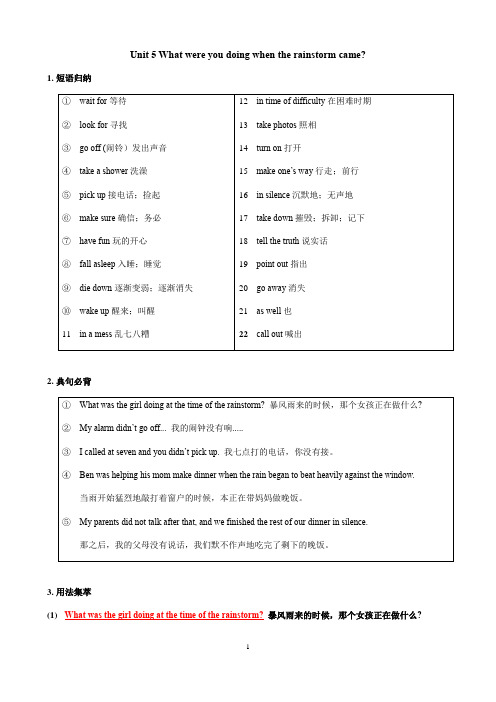
Unit 5 What were you doing when the rainstorm came?1.短语归纳2.典句必背3.用法集萃(1)What was the girl doing at the time of the rainstorm?暴风雨来的时候,那个女孩正在做什么?❖本句是特殊疑问句,时态是过去进行时,结构是“What+was/were+主语+doing+其他?”,用于询问某人在过去的某个时间正在做的事情。
例:—What were you doing at nine o’clock yesterday evening? 昨天晚上九点你正在做什么?—I was watching TV at home. 我正在家里看电视。
❖拓展:过去进行时描述过去某个时刻正在发生的动作或存在的状态,结构是“was/ were+动词的现在分词”。
例:When I got home my mother was cooking. 我到家的时候我妈妈正在做饭(2)My alarm didn’t go off... 我的闹钟没有响.....❖go off意为“(闹钟)发出响声”例:My alarm goes off at six every morning. 我的闹钟每天早晨6点响。
❖归纳:go off还有“离开”和“变质”之意。
例:Bob went off to get a drink. 鲍勃拿饮料去了。
Meat goes off quickly in hot weather. 热天肉变质得快。
❖拓展:go的短语(3)I called at seven and you didn’t pick up. 我七点打的电话,你没有接。
❖pick up意为“接电话”。
pick up有如下含义:(4)I called again at eight and you didn’t answer then either. 我八点再打来,你也没接。
人教版英语八年级下册Unit 1-5 单元语法知识梳理
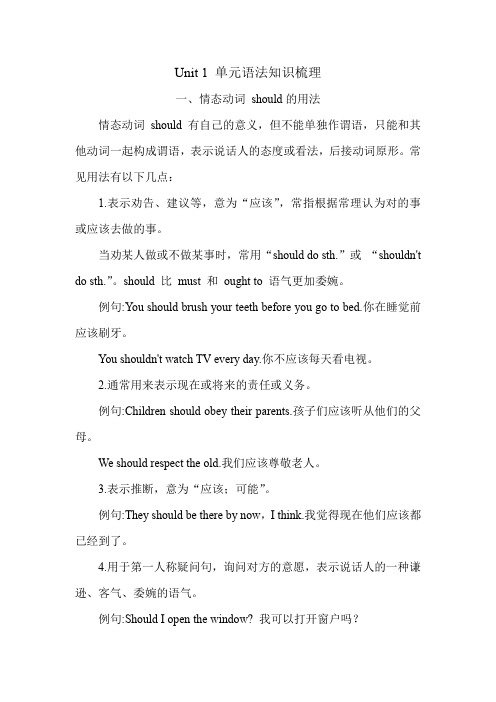
Unit 1 单元语法知识梳理一、情态动词should的用法情态动词should有自己的意义,但不能单独作谓语,只能和其他动词一起构成谓语,表示说话人的态度或看法,后接动词原形。
常见用法有以下几点:1.表示劝告、建议等,意为“应该”,常指根据常理认为对的事或应该去做的事。
当劝某人做或不做某事时,常用“should do sth.”或“shouldn't do sth.”。
should 比must 和ought to 语气更加委婉。
例句:You should brush your teeth before you go to bed.你在睡觉前应该刷牙。
You shouldn't watch TV every day.你不应该每天看电视。
2.通常用来表示现在或将来的责任或义务。
例句:Children should obey their parents.孩子们应该听从他们的父母。
We should respect the old.我们应该尊敬老人。
3.表示推断,意为“应该;可能”。
例句:They should be there by now,I think.我觉得现在他们应该都已经到了。
4.用于第一人称疑问句,询问对方的意愿,表示说话人的一种谦逊、客气、委婉的语气。
例句:Should I open the window? 我可以打开窗户吗?What should we do now? 我们现在该干什么呢?5.表示某种感情色彩,意为“竟会”,常用于以how, why开头引导的特殊疑问句中。
例句:Why should you be so early today? 你今天为什么会如此早?二、反身代词1.反身代词的构成反身代词是一种表示反射或强调的代词。
它由第一人称、第二人称的形容词性物主代词和第三人称代词的宾格加词尾-self或-selves构成。
其构成如下表:反身代词与它所指代的名词或代词形成互指关系,两者在人称和数上应保持一致。
初中英语人教版八年级下册重点语法详解( Unit 1-6)

八年级英语下册重点语法详解Unit 1Irene Irene中英文天地 2023-03-16 12:19 发表于广东1.have / get / catch a(n)+疾病名称,表示患某种疾病。
e.g.I have / get / catch a cold.我感冒了。
【拓展】have a bad cold 重感冒have a fever 发烧have a headache 头痛have a stomachache 肚子痛, 胃痛have a toothache 牙痛have a backache 背痛2.lie down 躺下e.g.You had better lie down and have a rest.你最好躺下休息。
3.have a rest = take a rest = rest 休息have a break=have breaks=take a break=take breaks (课间)休息4.away from 离开……;与……有一定的距离(与不同动词搭配,意思会受上下文影响)e.g.They live away from us.他们住的地方离我们远。
5.see sb.doing sth.看见某人正在做某事e.g.When I pass the window I see him drawing a picture.当我经过窗户时,看到他正在画画。
see sb.do sth.看见某人做过某事e.g.I often see him draw pictures.我经常看到他在画画。
6.think twice 认真思考,权衡利弊e.g.We must think twice before we make this decision.我们在做决定之前应该权衡利弊。
7.to one’s surprise 使……惊讶的是,出乎……意料e.g.To their surprise, all the students pass the exam.令他们惊讶的是,所有学生都通过考试了。
人教版八年级下册英语Unit 10单元语法知识点总结

人教版八年级下册英语Unit 10单元语法知识点总结本单元重点短语的具体用法1. "These days":表示目前或现在的情况。
例如:These days, more and more people are using mobile phones.(现在,越来越多的人使用手机。
)2. "Regard with great interest":表示以极大的兴趣关注着。
例如:I always regard with great interest the development of technology.(我总是以极大的兴趣关注着技术的发展。
)3. "In order to":表示目的。
例如:She studies hard in order to get good grades.(她努力学习是为了取得好成绩。
)4. "So far":迄今为止,到现在为止。
例如:So far, we have learneda lot of new knowledge.(到目前为止,我们已经学到了很多新知识。
)5. "In need":需要。
例如:We should help those in need.(我们应该帮助那些需要帮助的人。
)6. "Not...anymore":不再......例如:He doesn't play basketball anymore.(他不再打篮球了。
)7. "Welcome to sp.":欢迎来到......例如:Welcome to our school.(欢迎来到我们学校。
)8. "Check out":察看、观察。
例如:Let's check out the new restaurant.(我们去看看那家新餐厅吧。
(完整版)人教版英语八年级下册重点词组、句型及语法点汇总,推荐文档
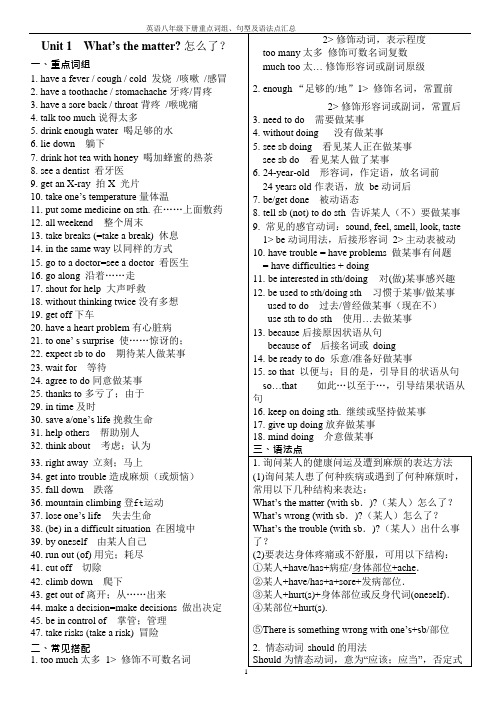
13.be back 回来14.be angry with sb 生某人的气15.throw down 扔下16.the minute=as soon as 一…就…e over 过来18.sit down 坐下19.take sb. for a walk 带某人去散步20.all the time 频繁;反复21.all day / evening 整日/夜22.shout back 大声回应23.walk away 走开24.in surprise 惊讶地25.share the housework 分担家务26.hang out 闲逛27.do chores 做杂务28.go to the store 去商店29.buy drinks and snacks 买饮料和点心30.make sb. do sth. 使某人做某事31.have enough stress from 有来自…足够的压力32.a waste of time 浪费时间33.in order to 为了34.get good grades 取得好成绩35.depend on 依赖;依靠36.have no idea 不知道37.develop children’s independence 发展孩子独立性38.look after=take care of 照顾;照看39.as a result 结果40.agree with sb 同意某人的观点/意见disagree with sb 不同意某人的观点/意见二、常见搭配1.finish doing sth. 完成做某事2.a few “几个”,后接可数名词复数few “很少,几乎没有”,后接可数名词复数a little “一点儿”,后接不可数名词little “很少,几乎没有”,后接不可数名词3.1> question “问题”,需要回答的问题,与ask或answer 搭配2> problem “问题”,需要解决的问题,与solve 搭配in the front of “在…前面”,在所说范围之内5.as…as… “与…一样…”,中间加形容词或副词原级,。
人教版八年级英语语法知识点归纳总结

人教版八年级英语语法知识点归纳总结八年级英语语法知识点归纳总结如下:
1. 一般现在时:表示经常性或习惯性的动作、真理、客观事实等。
2. 现在进行时:表示当前正在进行的动作。
3. 一般过去时:表示过去某个时间或状态的动作。
4. 过去进行时:表示过去某个时间正在进行的动作。
5. 一般将来时:表示将来要发生的动作或存在的状态。
6. 现在完成时:表示过去某个时间开始,一直延续到现在或刚刚结束的动作。
7. 过去完成时:表示过去某个时间之前已经发生的动作。
8. 被动语态:表示主语是动作的承受者。
9. 情态动词:表示可能性、能力、愿望、推测等情态。
10. 定语从句:用来修饰名词或代词的从句。
11. 名词性从句:在句子中充当名词的从句。
12. 状语从句:在句子中充当状语的从句。
13. 直接引语和间接引语的转换:将别人的话改写成自己的话,或将自己的话变成引用别人的话。
14. 倒装句:为了强调某个部分或使句子更加流畅而改变主谓语的位置。
15. 非谓语动词:包括不定式、动名词和现在分词等形式。
这些是八年级英语常见的语法知识点,希望对你有帮助。
如
有其他问题,请随时提问。
人教版八年级下册英语Unit 7单元语法知识点总结

人教版八年级下册英语Unit 7单元语法知识点总结本单元重点短语的具体用法1. as big as:与……一样大。
例如:This building is as big as that one.(这栋建筑和那栋一样大。
)2. feel free to do sth.:随意地做某事。
例如:You can feel free to ask me any questions.(你可以随意问我任何问题。
)3. one of the oldest countries:最古老的国家之一。
例如:China is one of the oldest countries in the world.(中国是世界上最古老的国家之一。
)4. risk their lives:拿生命冒险。
例如:The firefighters risk their lives to save people.(消防员们冒着生命危险去救人。
)5. as far as I know:据我所知。
例如:As far as I know, he is a very talented musician.(据我所知,他是一位非常有才华的音乐家。
)6. as you can see:正如你所看到的。
例如:As you can see, the weather is very nice today.(正如你所看到的,今天的天气非常好。
)7. be in danger:处于危险中。
例如:The pandas are in danger of extinction.(熊猫面临灭绝的危险。
)8. live up to:活到。
例如:People are living longer than ever before.(人们的寿命比以往任何时候都要长。
)9. part of...:……的组成部分。
例如:Reading is an important part of learning.(阅读是学习的重要组成部分。
人教版初二英语下册语法

⼀.重点短语归纳1. foot---feet 脚 tooth---teeth ⽛齿2. have a cold 感冒3. have a stomachache 胃疼4. have a sore back背疼5. have a sore throat喉咙疼6. have a fever发烧7. lie down and (have a)rest 躺下休息 have a rest 休息8. hot tea with honey 加蜜的热茶9. see a dentist 看⽛医 see a doctor 看医⽣10.drink lots of water多喝⽔11.lots of ,a lot of, a lota lot of=lots of,可以修饰可数名词复数和不可数名词,⼀般⽤在肯定句中。
:There are lots of ( a lot of) books in our library.There is a lot of water on the grounda lot,是⼀个副词词组,跟动词连⽤;表⽰⼗分,很等意思; Thanks a lot.12. have a toothache⽛疼13. That’s a good idea好主意14. go to bed 去睡觉 go to bed early 早上床睡觉15. feel well感到好 feel ill 感到不舒服I don’t feel well= I’m not feeling well我感觉不舒服.16. start doing/ to do sth开始做某事TO DO 是⼀件事情完成了,开始做另外⼀件事情DOING是原来的那件事情做到⼀半,现在⼜开始做了,是同⼀件事情。
17. two days ago两天前18. get some rest 多休息, 休息⼀会⼉19. I think so我认为是这样20. be thirsty⼝渴21. be hungry 饥饿22. be stressed out紧张23. listen to music听⾳乐24. healthy lifestyle健康的⽣活⽅式25. traditional Chinese doctors传统中医26. need to do sth 需要做某事I have a toothache. I need to see a dentist. 我⽛痛, 我需要去看⽛医.We need to keep our classroom clean. 我们需要保持教室的⼲净.27. a balance of yin and yang阴阳平衡28. for example例如29. too much yin太多的阴, 阴⽓太盛too much + 不可数名词太多的…much too +形/副实在太… 极其,⾮常too many + 可数名词复数太多的…30.be good for sth./ doing sth. 对什么有益,对什么有好处be bad for sth./ doing sth. 对什么有害be good to 对…好be good at =do well in 在……⽅⾯好,擅长be good(bad) for、be good at的相关⽤法 1.be good for 对......有益 Doing morning exercises is good for your health. 做早操对你们的建康有益。
人教版八年级下册各单元英语语法解析知识重点总结
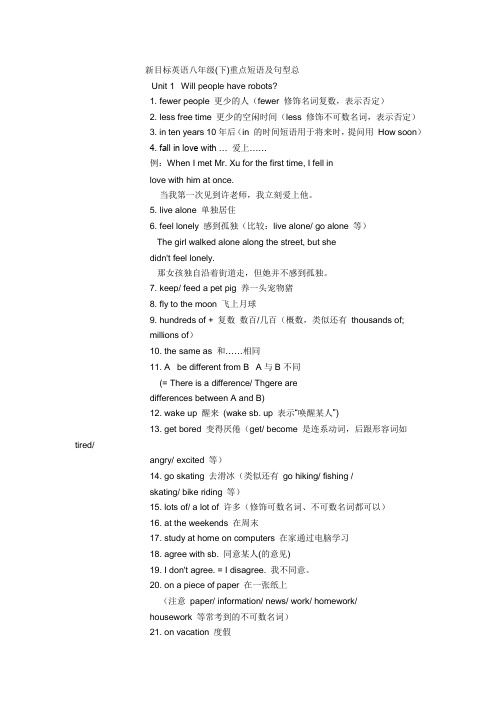
新目标英语八年级(下)重点短语及句型总Unit 1 Will people have robots?1. fewer people 更少的人(fewer 修饰名词复数,表示否定)2. less free time 更少的空闲时间(less 修饰不可数名词,表示否定)3. in ten years 10年后(in 的时间短语用于将来时,提问用How soon)4. fall in love with … 爱上……例:When I met Mr. Xu for the first time, I fell inlove with him at once.当我第一次见到许老师,我立刻爱上他。
5. live alone 单独居住6. feel lonely 感到孤独(比较:live alone/ go alone 等)The girl walked alone along the street, but shedidn't feel lonely.那女孩独自沿着街道走,但她并不感到孤独。
7. keep/ feed a pet pig 养一头宠物猪8. fly to the moon 飞上月球9. hundreds of + 复数数百/几百(概数,类似还有thousands of;millions of)10. the same as 和……相同11. A be different from B A与B不同(= There is a difference/ Thgere aredifferences between A and B)12. wake up 醒来(wake sb. up 表示“唤醒某人”)13. get bored 变得厌倦(get/ become 是连系动词,后跟形容词如tired/angry/ excited 等)14. go skating 去滑冰(类似还有go hiking/ fishing /skating/ bike riding 等)15. lots of/ a lot of 许多(修饰可数名词、不可数名词都可以)16. at the weekends 在周末17. study at home on computers 在家通过电脑学习18. agree with sb. 同意某人(的意见)19. I don't agree. = I disagree. 我不同意。
人教版八年级下册英语——知识点语法归纳总结
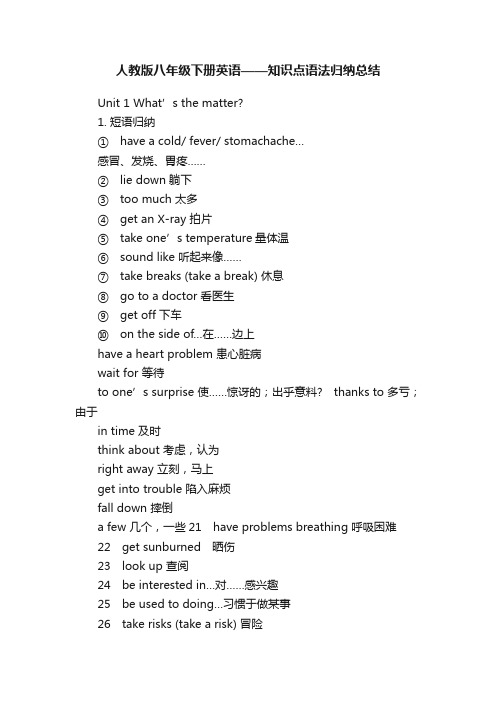
人教版八年级下册英语——知识点语法归纳总结Unit 1 What’s the matter?1. 短语归纳①have a cold/ fever/ stomachache…感冒、发烧、胃疼……②lie down 躺下③too much 太多④get an X-ray 拍片⑤take one’s temperature量体温⑥sound like 听起来像……⑦take breaks (take a break) 休息⑧go to a doctor 看医生⑨get off 下车⑩on the side of…在……边上have a heart problem 患心脏病wait for 等待to one’s surprise 使……惊讶的;出乎意料? thanks to 多亏;由于in time 及时think about 考虑,认为right away 立刻,马上get into trouble 陷入麻烦fall down 摔倒a few 几个,一些21 have problems breathing 呼吸困难22 get sunburned 晒伤23 look up 查阅24 be interested in…对……感兴趣25 be used to doing…习惯于做某事26 take risks (take a risk) 冒险27 lose one’s life 丧生28 became of 因为29 run out (of) 用尽,耗尽30 be ready to do sth. 准备做某事31 cut off 切除32 climb down 爬下33 get out of 离开;从……出来34 tell of 讲述35 the importance of (doing sth.) (做某事的)重要性36 be in control of 掌管,管理37 make a decision 做决定38 keep on doing sth. 坚持做某事39 give up 放弃40 cut/ hurt oneself 使自己受伤2. 典句必背①What’s the matter?②I have a stomachache.③What should I do?④Should I take my temperature?⑤I think you should lie down and rest.⑥If your head and neck still hurt tomorrow, then go to a doctor.⑦His love for mountain climbing is so great that he kept on climbing mountains even after this experience.3. 用法集萃(1) 当别人心情不好,身体不适或遇到麻烦时,我们可以用如下表达表示关心:What’s the matter?What’s the matter with you?What’s wrong with …?What’s the trouble\problem with …?(2) 英语中常用have描述身体的不适,此时have意为“患有”,常用结构:①have a + 疾病例:have a cold 感冒;have a fever 发烧;have a cough 咳嗽②have a + 身体部位-ache例:have a headache 头痛;have a toothache 牙痛③have a sore + 身体部位例:have a sore throat 咽喉痛;have a sore back 背痛(3) lie down躺下;tell lies/a lie 说谎含义过去式过去分词躺;平躺lay lain位于撒谎;说谎lied lied(4) maybe & may be①maybe,“或许”,常用于句首,表示可能性,后加句子。
新人教版|八年级下册英语所有语法全汇总
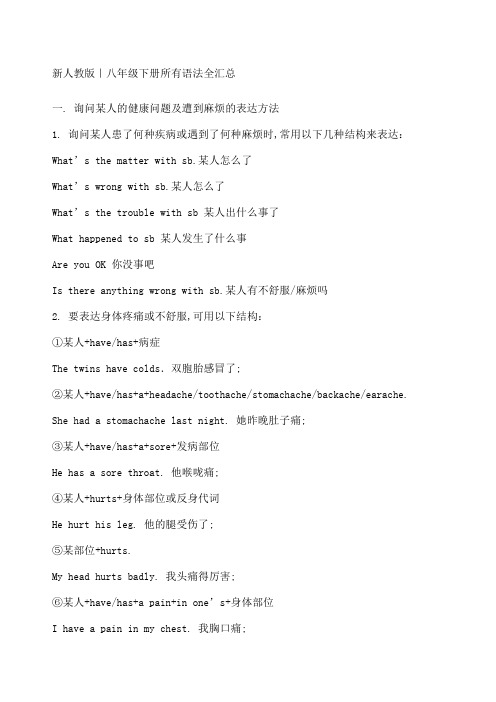
新人教版|八年级下册所有语法全汇总一. 询问某人的健康问题及遭到麻烦的表达方法1. 询问某人患了何种疾病或遇到了何种麻烦时,常用以下几种结构来表达:What’s the matter with sb.某人怎么了What’s wrong with sb.某人怎么了What’s the trouble with sb 某人出什么事了What happened to sb 某人发生了什么事Are you OK 你没事吧Is there anything wrong with sb.某人有不舒服/麻烦吗2. 要表达身体疼痛或不舒服,可用以下结构:①某人+have/has+病症The twins have colds.双胞胎感冒了;②某人+have/has+a+headache/toothache/stomachache/backache/earache. She had a stomachache last night. 她昨晚肚子痛;③某人+have/has+a+sore+发病部位He has a sore throat. 他喉咙痛;④某人+hurts+身体部位或反身代词He hurt his leg. 他的腿受伤了;⑤某部位+hurts.My head hurts badly. 我头痛得厉害;⑥某人+have/has+a pain+in one’s+身体部位I have a pain in my chest. 我胸口痛;⑦There is something wrong with one’s+身体部位There is something wrong with my right eye. 我的右眼有毛病;⑧其他表达方式She has a heart trouble. 她有心脏病;He got hit on the head. 他头部受到了撞击;She cut her finger. 她割破手指了;二. 情态动词should的用法1. should为情态动词,意为“应该;应当”,否定式为shouldn’t,其后接动词原形,无人称和数的变化;常用来表示征询意见、建议、劝告、要求或义务等;You should drink more water. 你应该多喝水;He should put his head back. 他应该把头后仰;We should try our best to help him. 我们应当尽力去帮助他; You shouldn‘t watch TV. 你不应该看电视;2. should用于主语为第一人称的疑问句,表示征询意见;Should I put some medicine on it 我应当给它敷上药吗Should we tell her about it 我们应该告诉她这件事吗3. 在英语中,表示建议的说法有很多,而且都是中考考查的重点;主要结构有:①Would you like to do sth你想要/愿意做某事吗Would you like to play basketball with me 你想要和我一起打篮球吗②Shall I/we do sth 我/我们做某事好吗Shall we go to the zoo tomorrow 明天我们去动物园,好吗③Why not do sth 为什么不......呢Why not join us为什么不加入到我们当中来呢④How/What about doing sth 做某事怎么样How about going swimming 去游泳怎么样⑤Let’s do sth. 让我们做......吧;Let’s go home. 咱们回家吧;⑥You’d better not do sth 你最好不要做某事;You’d better not go there alone. 你最好不要一个人去那儿;三. 反身代词英语中共有八个反身代词,在使用时应注意和它所指的相应的对象在人称、性别和数上保持一致;第一人称第二人称第三人称单数 myself yourself himself/herself/itself复数 ourselves yourselves themselves反身代词的用法1. 可用作宾语,指的是宾语和主语表示同一个或同一些人或事物;如:Maria bought herself a scarf.We must look after ourselves very well.2. 可用作表语,指的是表语和主语表示同一个或同一些人或事物;如: She isn’t quite herself today.3. 可用作主语或宾语的同位语,常用来加强语气;如:She herself will fly to London tomorrow.I met the writer himself last week.4. 用在某些固定短语当中;如:look after oneself / take care of oneself 照顾自己teach oneself sth./learn sth. by oneself 自学enjoy oneself 玩得高兴,过得愉快help oneself to sth 请自用……随便吃/喝些……hurt oneself 弄伤自己say to oneself 自言自语leave sb. by oneself 把某人单独留下注意反身代词不能单独做主语,但可以做主语的同位语,起强调作用;如:我自己能完成作业;误Myself can finish my homework.正I myself can finish my homework. / I can finish my homework myself.四. 一般将来时一般将来时表示将来某个时间要发生的动作或状态,或将来经常发生的动作或状态;一般将来时的基本结构1. will+动词原形否定式:will not=won't一般疑问式:will/shall+主语+动词原形+其他特殊疑问式:特殊疑问词+一般疑问式—Will he help you with your English tonight今天晚上他会帮助你学习英语吗—Yes, he will./No, he won't.是的,他会;/不,他不会;—When will you arrive for America你什么时候去美国—Tomorrow.明天;2. am/is/are going to +动词原形否定式:am/is/are not going to +动词原形一般疑问式:am/is/are +主语+ going to + 动词原形+其他特殊疑问式:特殊疑问词+一般疑问式Look at the dark clouds. There is going to be a storm.看那乌云,快要下雨了;Is he going to collect any data for us他会帮我们收集数据吗What are you going to do tomorrow明天你打算作什么3. will+动词原形与am/is/are going to +动词原形的用法区别will+动词原形与am/is/are going to +动词原形的用法虽然都表示将来发生动作或情况,一般情况下能互换;但它们的用法是有区别的;will主要用于在以下三个方面:1表示主观意愿的将来;They will go to visit the factory tomorrow.明天他们将去厂参观工厂;2表示不以人的意志为转移的客观的将来;He will be thirty years old this time next year.明年这个时候他就将三十岁;3表示临时决定,通常用于对话中;—Mary has been ill for a week.玛丽病了一周了;—Oh, I didn't know. I will go and see her.噢,我不知道;我去看看她;be going to主要用于以下两个方面:1表示事先经过考虑、安排好打算、计划要做某事;Dad and I are going to watch an opera this afternoon.今天下午我和爸爸打算去看歌剧;2表示根据目前某种迹象判断,某事非常有可能发生,表示推测;Look There come the dark clouds. It is going to rain.瞧乌云密集;天要下雨了;五. 动词不定式to do的用法1. 作主语为避免句子的头重脚轻,常用it作为形式主语,而真正的主语动词不定式后置; 常用句型:It +be+adj./n.+for/of sb. to do sth./It takes sb. some time to do sth.2. 作宾语动词want, decide, hope, ask, agree, choose, learn, plan, need, teach, prepare常接动词不定式作宾语;3. 作后置定语常用于“have/has+sth.+to do”或“Its time to do sth.”等结构中;4. 作宾语补足语tell, ask, want, invite, teach, like, call等可接带to的动词不定式作宾语补足语,构成tell/ask/want /call/invite sb. to do sth.结构;注意动词不定式作使役动词和感官动词的宾语补足语时应省去to:“一感feel,二听listen to, hear,三让let, make, have,四看look at, see, watch, notice,半帮助help”;5. 动词不定式作状语主要用来修饰动词,表示目的,结果或原因;为了强调目的,有时可以把动词不定式放在句首,或在不定式前加in order to 或so as to “为了,目的是”;六. Could you please...句型1. 请求别人时通常用此句型,也可以说Can you...please情态动词could或can 在这里均表示请求,在意思上无区别,但是用could在于其显得更委婉、客气、诚恳;在日常生活中常使用could you/I...若在句末加上please,则显得更礼貌; Could you help me find my book, please你能帮我找到我的书吗2. 对could you/I...的问句作出肯定回答,常用“sure/certainly/of course”等;如果作否定回答,常用“sorry或oh, please don’t”; 一般不用no开头,用no显得语气生硬、不礼貌;3. 表示请求的其他句式Would you like to do...Would you mind doing...Let’s do....Please do...祈使句前加please七. 过去进行时1. 基本概念:过去进行时表示在过去某一时刻或一段时间内正在进行的动作;这一特定的过去时间除有上下文暗示以外, 一般用时间状语来表示;常用的时间状语this morning, the whole morning, all day yesterday, from nine to ten last evening, when, while等;We were watching TV from seven to nine last night.昨天晚上七点到九点的时候我们在看电视;It was raining when they left the station.他们离开车站的时候天正在下雨;2. 基本结构 was / were not + 动词-ing3. 一般过去时与过去进行时用法的比较一般过去时表示在过去某个时间发生过的动作或存在的状态, 而过去进行时则表示在过去某一时刻或某一段时间正在进行的动作;David wrote a letter to his friend last night. 大卫昨晚给他的朋友写了封信;信写完了;David was writing a letter to his friend last night. 大卫昨晚一直在给他的朋友写信;信不一定写完;八. 状语从句1. unless引导条件状语从句unless = if...not... 除非,若不They will go tomorrow unless it rains.= They will go tomorrow if it doesn’t rains.2. as soon as引导时间状语从句,意为“一...就...”;He will come and see you as soon as he can.3. so...that...引导结果状语从句句型1:主语+谓语+so+形容词/副词+that从句The wind was so strong that we could hardly move forward. 句型2: so +形容词 + a/an + 单数名词 + that从句It was so hot a day that they all went swimming.句型3. so + many/ few + 复数名词 + that从句He has so few friends that he often feels lonely.句型4: so +much/ little + 不可数名词 + that 从句I had so little money that I couldn’t buy a pen.九. 形容词/副词的比较等级形容词和副词有三个比较等级,即原级也就是原形、比较级表示“较……”或“更……”的意思,用于两者之间比较和最高级表示“最……”的意思,用于三者或三者以上的比较;1. 形容词/副词的比较级和最高级的规则变化1单音节词和少数以-er,-ow结尾的双音节单词,比较级在后面加-er,最高级在后面加-est;①单音节单词small→smaller→smallestshort→shorter→shortesttall→taller→tallestgreat→greater→greatest②少数以-er,-ow结尾的双音节单词clever→cleverer→cleverestnarrow→narrower→narrowest2以不发音e结尾的单音节单词,比较级在原形后加-r,最高级在原级后加-st; large→larger→largestnice→nicer→nicestable→abler→ablest3以一个辅音字母结尾的闭音节即:辅音+元音+辅音单词中,先双写末尾的辅音字母,比较级加-er,最高级加-est;big→bigger→biggesthot→hotter→hottestfat→fatter→fattest4以“辅音字母+y”结尾的双音节词, 把y改为i,比较级加-er,最高级加-est; easy→easier→easiestheavy→heavier→heaviestbusy→busier→busiesthappy→happier→happiest5其他双音节词和多音节词,比较级在前面加more,最高级在前面加most; beautiful→more beautiful→most beautifuldifferent→more different→most differenteasily→more easily→most easily2. 形容词/副词的比较级和最高级的不规则变化good→better→bestwell→better→bestbad→worse→worstill→worse→worstold→older/elder→oldest/eldestmany/much→more→mostlittle→less→leastfar →further/farther→ furthest/farthest3. 原级常用句型1A is as+原级+ as+ B 表示A与B一样...eg. He is as tall as me.2A is not as/so +原级+ as B 表示A不如B...eg. He is not as tall as me.3只能修饰原级的词,very,quite,so,too,so,enough,pretty等 ; eg. He is too tired to walk on.他太累了以至于不能再继续走了;4. 比较级常用句型1当句中有than时则用比较级;eg. He is fatter than me.2“特殊疑问词+be+形容词比较级,A or B ”eg. Which is bigger,the earth or the moon哪一个更大,地球还是月球3“比较级+and+比较级”表示“越来越...”;eg. The flowers are more and more beautiful.花儿越来越漂亮;English is more and more important. 英语越来越重要了;4“the+比较级,the+比较级”表示“越...,越...”;eg. The more careful you are,the fewer mistakes you’ll make.5可以修饰比较级的词:much,a lot,far,a little,a bit,even,still等;eg. Lesson One is much easier than Lesson Two. 第一课比第二课容易得多;5. 最高级常用句型1.“主语+be+the+形容词最高级+单数名词+in/of...”表示“……是……中最……的”;Tom is the tallest in his class/of all the students.汤姆是他们班上/所有学生当中最高的;2.“主语+实意动词+the+副词最高级+in/of...”表示“……是……中最……的”;I jump the farthest in my class.我是我们班跳得最远的;3.“主语+be+one of the+形容词最高级+复数名词+in/of...”表示“……是……中最……之一”;Beijing is one of the largest cities in China.北京是中国最大城市之一;4.“特殊疑问词+be+the+最高级,甲,乙,or丙”用于三者或三者以上的比较; Which country is the largest,China,Brazil or Canada哪个国家最大,中国,巴西还是加拿大5.“特殊疑问词+助动词+主语+the+副词最高级+甲,乙,or丙”用于三者或三者以上的比较;Which season do you like the best,spring,summer or autumn你最喜欢哪一个季节,春天,夏天还是秋天注意:副词最高级用在句中时,其前可以加the,也可以不加;但形容词最高级用在句中时,其前一般都要加the;十. 现在完成时一. 现在完成时基本结构①肯定句:主语+have/has+动词的过去分词②否定句:主语+have/has+not+动词的过去分词③一般疑问句:Have/Has+主语+动词的过去分词④特殊疑问句:特殊疑问词+一般疑问句have/has+主语+过去分词二. 现在完成时用法1. 现在完成时用来表示过去已经完成的动作对现在造成影响或后果;也就是说,动作或状态发生在过去但它的影响现在还存在,强调的是现在;I have already posted the photo.我已经邮寄出了照片;与此种用法连用的时间状语时一些模糊的过去时间状语,如already肯定句, yet 否定句/疑问句, just, before, recently,still, lately,never等;2. 现在完成时也可用来表示动作或状态发生在过去某一时刻,持续到现在并且有可能会继续持续下去;He has lived here since 1978.自从1978年以来,他一直住在这儿;动作起始于1978年,一直住到现在,可能还要继续住下去;此种用法常与for+时间段,since+时间点或过去时的句子连用;谓语动词必须是延续性动词;有些瞬间动词可变为延续动词:go out----be outfinish----be overopen----be opendie----be deadbuy---havefall ill---be illcome back----be backcatch a cold----have a cold。
人教版八年级英语下册单词-短语-句型和语法总结

⼈教版⼋年级英语下册单词-短语-句型和语法总结Unit1What’s the matter?【重点单词】matter [?m?t?] v.重要,要紧,有关系What’s the matter? 怎么了?出什么事了?sore [s?:(r)] adj. 疼痛的,酸痛的have a cold感冒stomach ['st?m?k]n. 胃,腹部stomachache ['st?m?ke?k] n.胃痛,腹痛have a stomachache 胃痛foot(复数feet) [fu:t] n. 脚neck [nek] n.颈,脖⼦throat[θr??t] n.喉咙fever ['fi:v?]n. 发烧,发热lie [la?]v. 躺,平躺lie down躺下rest [rest] n. 剩余部分,其余;放松,休息cough [k?f] n. & v.咳嗽X-ray ['eksre?] n.X光,X射线toothache[?tu:θe?k] n. ⽛痛takeone's temperature 量体温headache [?hede?k] n.头痛have a fever发烧break [bre?k] n. &v. 休息,暂停;打破take breaks (take a break) 休息hurt [h?:t] v.伤害,损害,使受伤passenger ['p?s?nd??]n. 乘客,旅客off[?f] adv. prep.离开(某处);从…去掉get off 下车to one's surprise 使…惊讶,出乎…意料onto [??nt?]prep. 向,朝trouble[?tr?bl] n. ⿇烦,烦扰,问题hit [hit] n. & v.碰撞,打,打击right away ⽴即,马上get into陷⼊,参与herself [h?:?self]pron.她⾃⼰,她本⾝(she的反⾝代词)bandage ['b?nd?d?]n.& v. 绷带;⽤绷带包扎sick [s?k] adj.患病的,不适的knee [ni:] n.膝盖nosebleed [?n??zbli:d]n. ⿐出⾎breathe [bri:e] v.呼吸sunburned[?s?nb?:nd] adj. 晒伤的ourselves[ɑ:?selvz] pron. 我们⾃⼰(we的反⾝代词)climber [?kla?m?(r)] n. 登⼭者be used to 习惯于… 适应于…risk[r?sk] n. &v. 风险,危险;冒险take risks (take a risk)冒险accident [??ksid?nt] n. 意外事件;事故situation [?sitju?ei??n] n. 状况,形式,情况kg=kilogram[?k?l?gr?m]n.公⽄,千克rock[r?k] n. 岩⽯run out (of) ⽤尽,耗尽knife [naif] n.⼑,餐⼑cut off 切除blood [bl?d] n. ⾎mean [mi:n] v. 意味着,意思是,意欲get out of离开,从… 出来importance [?m?p?:tns] n. 重要性decision [d?'s??n] n. 决⼼,决定,抉择control [k?n'tr??l] v.控制,⽀配,操纵be in control of 掌管,管理spirit['sp?r?t] n.勇⽓,意志death [deθ] n.死亡give up放弃nurse [n?:s]n. 护⼠【重点短语】1.have a fever 发烧2.havea cough咳嗽3.have atoothache⽛疼4.talk too much 说得太多5.drink enoughwater喝⾜够的⽔6.have a cold 受凉;感冒7.have a stomachache胃疼8.have asore back背疼9.have a sore throat喉咙痛10. take risks冒险11.hot teawith honey加蜂蜜的热茶12.see a dentist 看⽛医13.get an X-ray 拍X 光⽚14.takeone’ s temperature量体温15.putsomemedicine onsth. 在……上⾯敷药16.give up 放弃17. sound like听起来像18.all weekend 整个周末19. in the same way 以同样的⽅式20. go to a doctor 看医⽣21. goalong沿着……⾛22. on thesideofthe road 在马路边23. shout for help⼤声呼救24. without thinking twice没有多想25. get off 下车26. have a heart problem 有⼼脏病27. toone’ s surprise另某⼈惊讶的是28.thanksto 多亏了;由于29. in time 及时30.makea decision 做出决定31. get into trouble造成⿇烦32.right away⽴刻;马上33. becauseof由于34. getout of 离开;从……出来35. keep on doing sth. 继续或坚持做某事36.put abandage on sth. ⽤绷带包扎37.fall down 摔倒38. feel sick 感到恶⼼39. have a nosebleed流⿐⾎40.cuthis knee割伤他的膝盖41. put her head back把她的头向后仰42.have problems breathing 呼吸困难43. mountain climbing登⼭运动44. be used to doing sth.习惯做某事45. run out(of) ⽤完;⽤尽46. so that 以便47. so...that... 如此……以⾄于...…48. be in control of 掌管;管理49. in a difficult situation 在闲境中【重点句型】1. What's the matter with you?=What'the trouble with you?= What's wrong with you? 你怎么了?2. What should she do? 她该怎么办呢?3.Should I take my temperature?我应该量⼀下体温吗?4.You should lie down and rest.你应该躺下休息⼀会⼉。
(完整版)Unit1人教版八年级英语下册语法与知识点,推荐文档

Unit 1第一部分:Grammar一、情态动词(Modal Verbs)情态动词should 意为“应该,应当”,必须和后面的动词原形一起构成谓语,没有人称和数的变化。
用以表达职责和义务、提出劝告,而且表述的是自己的主观看法。
注意:should 在以why,who,how 等疑问词开头的问句中,意为“竟然,居然,怎么会”,表示意外、惊喜或在说话人看来是不可思议的。
三、反身代词表示反射或强调的代词叫做反身代词。
反身代词是由第一人称、第二人称形容词性物主代词或第三人称代词的宾格形式,词尾加self 或selves 组成。
反身代词可译“本人”、“本身”,为加强语气,也常翻译为“亲自”、“自己”。
不定人称代词one ---- o neself.第二部分:单词用法Section A1.What’s the matter?怎么了?该句常用询问某人患了何种疾病或遇到了什么麻烦,其后用with 引出对象。
1). What’s the matter with sb.?=what’s wrong with sb.?=what’s the trouble/problem with sb.?=what’s one’s trouble/problem?e.g. What’s the matter w ith Tom?=what’s with Tom?=What’s the with Tom?=What’s Tom’s?2). matter, 名词,“问题,事情”e.g. We have important (matter) to discuss.我们有些重要的问题要讨论。
3). 动词,“要紧,关系重大”e.g. It dosen’t that you came late.2.I have a cold. 我感冒了。
1).have/get/catch a cold “感冒,着凉”The old man a cold yesterday.那位老人昨天感冒了。
Unit1词汇,短语,语法归纳人教版八年级英语下册

八下 unit 1 语法归纳总结询问某人的健康问题及遇到事情麻烦等常用的表达方式1 What's the matter (with xx)?(某人)怎么了?2 What's wrong (with xx)?(某人)怎么了?3 What's the trouble (with xx)?(某人)怎么了?4 What happened (to xx)?(某人)发生了什么事?5 Are you OK? 你没事吧?6 Is there anything wrong with xx? 某人有什么事吗?练一练: What's the matter with your leg? ﹦________ ________ ________ ________ __________?﹦________ ________ ________ ________ __________?表达身体疼痛或不舒服,可用如下结构1. sb + have/ has + 病症Eg: Sb has/ have a cold/ bad cold/ cough/ fever/ temperature/ nosebleed某人有感冒,重感冒,咳嗽,发烧,出鼻血2.sb + has/have + a + 身体部位 + acheEg: Sb has/have a headache / toothache/ earache/ backache/ heartache/ stomachache 某人头痛,牙痛,耳朵疼,后背痛,心痛,胃痛3. sb + has/ have + a sore +发病部位Eg: Sb has/have a sore throat/ eye/ back/ arm某人嗓子疼,眼睛疼,后背疼,胳膊疼4. sb + has/have a pain (pains) in one's + 身体部位Eg:Sb has/have a pain in sb's head/ neck 某人头痛,脖子痛5. sb的某部位 + hurt(hurts)注:hurt的过去式,过去分词还是hurteg: My head hurts. 我头痛 His legs hurts。
人教版八年级下册英语Unit 5单元语法知识点总结
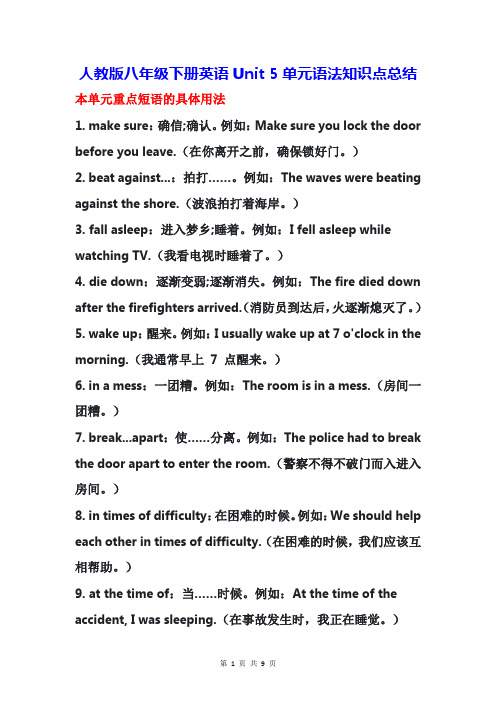
人教版八年级下册英语Unit 5单元语法知识点总结本单元重点短语的具体用法1. make sure:确信;确认。
例如:Make sure you lock the door before you leave.(在你离开之前,确保锁好门。
)2. beat against...:拍打……。
例如:The waves were beating against the shore.(波浪拍打着海岸。
)3. fall asleep:进入梦乡;睡着。
例如:I fell asleep while watching TV.(我看电视时睡着了。
)4. die down:逐渐变弱;逐渐消失。
例如:The fire died down after the firefighters arrived.(消防员到达后,火逐渐熄灭了。
)5. wake up:醒来。
例如:I usually wake up at 7 o'clock in the morning.(我通常早上7 点醒来。
)6. in a mess:一团糟。
例如:The room is in a mess.(房间一团糟。
)7. break...apart:使……分离。
例如:The police had to break the door apart to enter the room.(警察不得不破门而入进入房间。
)8. in times of difficulty:在困难的时候。
例如:We should help each other in times of difficulty.(在困难的时候,我们应该互相帮助。
)9. at the time of:当……时候。
例如:At the time of the accident, I was sleeping.(在事故发生时,我正在睡觉。
)10. go off:(闹钟)发出响声。
例如:The alarm went off at 6 o'clock.(闹钟在6 点钟响了。
Unit2词汇,短语,语法归纳人教版八年级英语下册
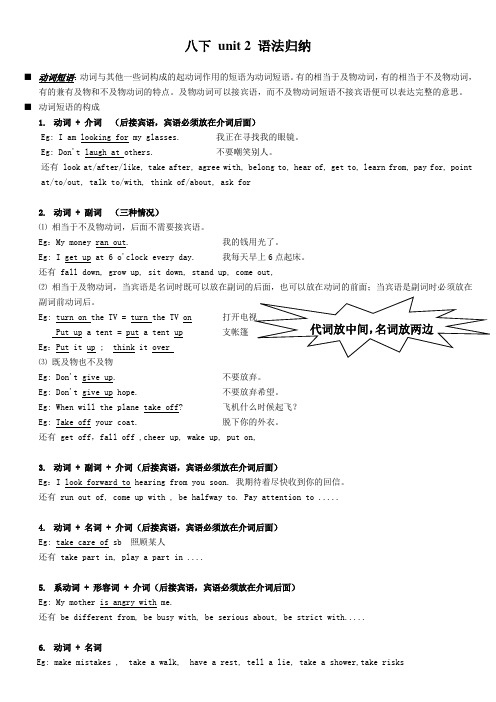
八下unit 2 语法归纳■动词短语:动词与其他一些词构成的起动词作用的短语为动词短语。
有的相当于及物动词,有的相当于不及物动词,有的兼有及物和不及物动词的特点。
及物动词可以接宾语,而不及物动词短语不接宾语便可以表达完整的意思。
■动词短语的构成1.动词 + 介词(后接宾语,宾语必须放在介词后面)Eg: I am looking for my glasses. 我正在寻找我的眼镜。
Eg: Don't laugh at others. 不要嘲笑别人。
还有 look at/after/like, take after, agree with, belong to, hear of, get to, learn from, pay for, point at/to/out, talk to/with, think of/about, ask for2.动词 + 副词(三种情况)⑴相当于不及物动词,后面不需要接宾语。
Eg:My money ran out. 我的钱用光了。
Eg: I get up at 6 o'clock every day. 我每天早上6点起床。
还有 fall down, grow up, sit down, stand up, come out,⑵相当于及物动词,当宾语是名词时既可以放在副词的后面,也可以放在动词的前面;当宾语是副词时必须放在Eg: turn on the TV = turn the TV onPut up a tent = put a tent up 支帐篷Eg:Put it up ; think it over⑶既及物也不及物Eg: Don't give up. 不要放弃。
Eg: Don't give up hope. 不要放弃希望。
Eg: When will the plane take off? 飞机什么时候起飞?Eg: Take off your coat. 脱下你的外衣。
人教版八年级下册英语Unit 3单元语法知识点总结

人教版八年级下册英语Unit 3单元语法知识点总结本单元重点短语的具体用法1. do the dishes:洗餐具- I need to do the dishes before going out.(我出门前需要洗餐具。
)2. take out the rubbish:倒垃圾- Can you take out the rubbish, please?(你能倒一下垃圾吗?)3. fold your clothes:叠衣服- Remember to fold your clothes neatly.(记得把你的衣服叠整齐。
)4. sweep the floor:扫地- She sweeps the floor every day.(她每天都扫地。
)5. make your bed:整理床铺- It's your turn to make your bed.(轮到你整理床铺了。
)6. clean the living room:打扫客厅- We need to clean the living room before guests arrive.(在客人到来之前,我们需要打扫客厅。
)7. go out for dinner:出去吃饭- Let's go out for dinner tonight.(我们今晚出去吃饭吧。
)8. go to the movies:去看电影- They like to go to the movies on weekends.(他们喜欢在周末去看电影。
)9. stay out late:在外面待到很晚- Don't stay out late, it's not safe.(别在外面待太晚,不安全。
)10. get a ride:搭车- I'll get a ride with my friend.(我会和我朋友一起搭车。
)11. work on doing sth:从事做某事- He is working on writing a novel.(他正在写一本小说。
人教版英语八年级下册 单词 短语 语法
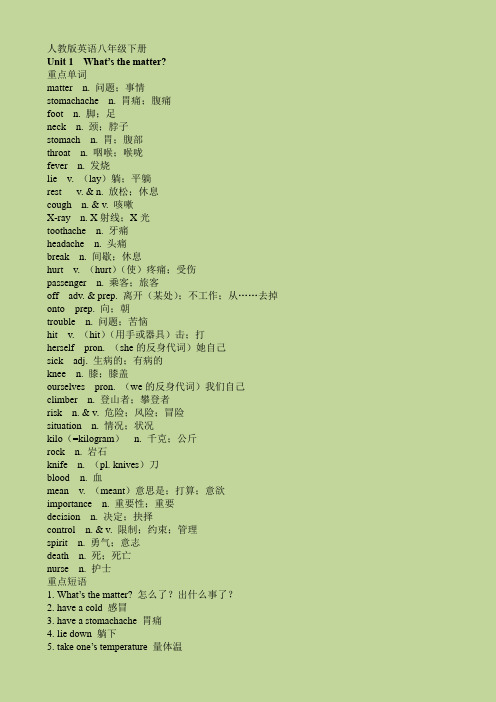
人教版英语八年级下册Unit 1What’s the matter?重点单词matter n. 问题;事情stomachache n. 胃痛;腹痛foot n. 脚;足neck n. 颈;脖子stomach n. 胃;腹部throat n. 咽喉;喉咙fever n. 发烧lie v. (lay)躺;平躺rest v. & n. 放松;休息cough n. & v. 咳嗽X-ray n. X射线;X光toothache n. 牙痛headache n. 头痛break n. 间歇;休息hurt v. (hurt)(使)疼痛;受伤passenger n. 乘客;旅客off adv. & prep. 离开(某处);不工作;从……去掉onto prep. 向;朝trouble n. 问题;苦恼hit v. (hit)(用手或器具)击;打herself pron. (she的反身代词)她自己sick adj. 生病的;有病的knee n. 膝;膝盖ourselves pron. (we的反身代词)我们自己climber n. 登山者;攀登者risk n. & v. 危险;风险;冒险situation n. 情况;状况kilo(=kilogram)n. 千克;公斤rock n. 岩石knife n. (pl. knives)刀blood n. 血mean v. (meant)意思是;打算;意欲importance n. 重要性;重要decision n. 决定;抉择control n. & v. 限制;约束;管理spirit n. 勇气;意志death n. 死;死亡nurse n. 护士重点短语1. What’s the matt er? 怎么了?出什么事了?2. have a cold 感冒3. have a stomachache 胃痛4. lie down 躺下5. take one’s temperature 量体温6. have a fever 发烧7. take breaks(take a break)休息8. get off 下车9. to one’s surprise 使……惊讶的;出乎……意料10. right away 立即;马上11. get into 陷入;参与12. be used to 习惯于……;适应于……13. take risks(take a risk) 冒险14. run out (of) 用尽;耗尽15. cut off 切除16. get out of 离开;从……出来17. be in control of 掌管;管理18. give up 放弃重点句型1. —What’s the matter?—I have a stomachache.2. —W hat’s the matter with Ben?—He hurt himself. He has a sore back.3. —Do you have a fever?—Yes, I do. / No, I don’t./I don’t know.4. —Does he have a toothache?—Yes, he does.5. —What should she do?—She should take her temperature.6. —Should I put some medicine on it?—Yes, you should. / No, you shouldn’t.7. You shouldn’t eat so much next time.He should lie down and rest.He should see a dentist and get X-ray.重点语法1. have在涉及健康问题的句子中的应用。
- 1、下载文档前请自行甄别文档内容的完整性,平台不提供额外的编辑、内容补充、找答案等附加服务。
- 2、"仅部分预览"的文档,不可在线预览部分如存在完整性等问题,可反馈申请退款(可完整预览的文档不适用该条件!)。
- 3、如文档侵犯您的权益,请联系客服反馈,我们会尽快为您处理(人工客服工作时间:9:00-18:30)。
although, so that及until引导的状语从句
1.although引导让步状语从句连词
although意为“虽然;尽管”,引导让步状语从句,可以放在主句前面,也可以放在主句后面。
例句:Although she's wrong, it's not a big deal.尽管她不对,但这也不是什么大不了的事。
You could help him although you didn't let him copy your homework.尽管你不让他抄你的作业,但你可以帮助他。
2.so that引导目的状语从句和结果状语从句
(1)so that意为“以便”,引导目的状语从句,一般放在主句后,且不用逗号隔开。
目的状语从句表示动机(即一种可能性),而非事实。
因此,从句中常带有can, will, could, would, should等情态动词。
例句:He should talk to his friend so that he can say he\'s sorry.他应当和他的朋友谈一谈,以便他能说声抱歉。
You must go now so that you won't be late.你必须现在就去,以便不会迟到。
(2)so that意为“以至于;结果”,引导结果状语从句,陈述的是客观事实,常常不带情态动词。
例句:He got up early so that he caught the early bus.他起得早,因此赶上了早班车。
My friend was ill so that she didn't come to school yesterday.我朋友生病了,所以她昨天没来上学。
3.until引导时间状语从句
连词until意为“直到……为止;到……时”,引导时间状语从句,常放在主句之后,也可以放在主句之前。
主句为一般将来时,从句要用一般现在时表示将来。
until用于肯定句中,意为“直到……为止”,主句谓语动词须用延续性动词;用于否定句中,意为“直到……才”,主句谓语动词通常用非延续性动词,也可用延续性动词。
例句:They talked on and on until four o'clock in the morning.他们一直谈到凌晨四点。
The letter passed from one to another until everyone had read it.这封信从一个人转手另一人直到每个人都看过。
I won't believe it until I see it with my own eyes.直到亲眼看见,我才会相信。
